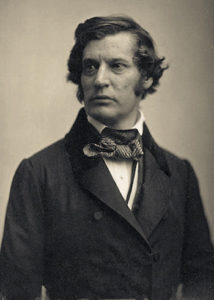
Charles Sumner
Charles Sumner was born on this date in 1811. He was a white-American politician and abolitionist.
He was from Boston, Massachusetts. Sumner, the son of a lawyer, was admitted to the bar after graduating from Harvard University in 1833. He developed radical political opinions, and after reading An Appeal in Favor of that Class of Americans Called Africans by Lydia Maria Child, he became active in the campaign against slavery. Sumner also supported education and prison reform. Sumner joined the Whig Party, but in 1848, he helped form the Free Soil Party. During this time, he legally challenged the segregated school system in Boston.
In 1851, in a coalition with the Democratic Party, Sumner was elected to Congress, becoming the Senate's leading opponent of slavery. After a speech Sumner made against pro-slavery groups in Kansas in 1856, he was beaten unconscious by Preston Brooks, a congressman from South Carolina. His injuries stopped him from attending the Senate for the next three years. In the secession crisis (1860-61), Sumner argued against any compromise and became one of the Congressional leaders of the Radical Republicans. During the American Civil War, he advocated that Black troops help end to slavery.
As chairman of the Senate Committee on Foreign Relations, Sumner used his political skills to prevent European intervention in the war. Sumner also opposed Abraham Lincoln’s treatment of Major General John C. Fremont, a commander of the Union Army in St. Louis, who had proclaimed that all slaves owned by Confederates in Missouri were free. Lincoln asked Fremont to modify his order. Fremont refused and was replaced by conservative General Henry Halleck. Sumner wrote to Lincoln saying it was sad "to have the power of a god and not use it godlike" Sumner also disagreed with Abraham Lincoln over suffrage.
Sumner wanted all Blacks to have the vote, whereas Lincoln favored partial enfranchisement. Sumner thought that universal suffrage would help the government, arguing, "the only Unionists of the South are Black." Despite their many disagreements, the two men remained close friends. On one occasion, Lincoln told Sumner, "the only difference between you and me is a difference of a month or six weeks in time."
Sumner also opposed President Andrew Johnson, arguing in Congress that Southern plantations should be taken from their owners and divided among the former slaves. He attacked Johnson’s attempt to veto the extension of the Freedman's Bureau, the Civil Rights Bill, and the Reconstruction Acts. Sumner urged an extensive economic aid program, land distribution, and free education for freed slaves. In November 1867, the Judiciary Committee voted 5-4 to impeach Andrew Johnson for high crimes and misdemeanors.
The majority report contained a series of charges, including pardoning traitors, profiting from the illegal disposal of railroads in Tennessee, defying Congress, denying the right to reconstruct the South, and attempting to prevent the ratification of the Fourteenth Amendment. At Johnson's impeachment trial, Sumner led the attack.
He argued that: "This is one of the last great battles with slavery. Driven from the legislative chambers, driven from the field of war, this monstrous power has found a refuge in the executive mansion, where, in utter disregard of the Constitution and laws, it seeks to exercise its ancient, far-reaching sway. All this is very plain. Nobody can question it. Andrew Johnson is the impersonation of the tyrannical slave power. In him, it lives again". He is the lineal successor of John C. Calhoun and Jefferson Davis, and he gathers about him the same supporters."
Sumner was bitterly disappointed when the Senate vote was one short of the required two-thirds majority for conviction. Sumner also criticized President Ulysses S. Grant for not doing more for Blacks. This upset senior members of the Republican Party, and he was removed as chairman of the Foreign Relations Committee. Sumner lost all faith in Grant, and in the 1872 presidential election, he supported his rival, Horace Greeley. Charles Sumner died of a heart attack on March 11, 1874.
The Encyclopedia Britannica, Fifteenth Edition.
Copyright 1996 Encyclopedia Britannica Inc.
ISBN 0-85229-633-0
